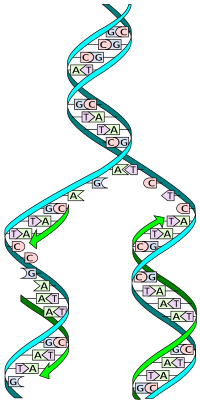
Photo from wikipedia
DNA replication is initiated by assembly of the kinase cell division cycle 7 (CDC7) with its regulatory activation subunit, activator of S-phase kinase (ASK), to activate DNA helicase. However, the… Click to show full abstract
DNA replication is initiated by assembly of the kinase cell division cycle 7 (CDC7) with its regulatory activation subunit, activator of S-phase kinase (ASK), to activate DNA helicase. However, the mechanism underlying regulation of CDC7-ASK complex is unclear. Here, we show that ADP generated from CDC7-mediated MCM phosphorylation binds to an allosteric region of CDC7, disrupts CDC7-ASK interaction, and inhibits CDC7-ASK activity in a feedback way. EGFR- and ERK-activated casein kinase 2α (CK2α) phosphorylates nuclear phosphoglycerate kinase (PGK) 1 at S256, resulting in interaction of PGK1 with CDC7. CDC7-bound PGK1 converts ADP to ATP, thereby abrogating the inhibitory effect of ADP on CDC7-ASK activity, promoting the recruitment of DNA helicase to replication origins, DNA replication, cell proliferation, and brain tumorigenesis. These findings reveal an instrumental self-regulatory mechanism of CDC7-ASK activity by its kinase reaction product ADP and a nonglycolytic role for PGK1 in abrogating this negative feedback in promoting tumor development.
Journal Title: Molecular cell
Year Published: 2018
Link to full text (if available)
Share on Social Media: Sign Up to like & get
recommendations!